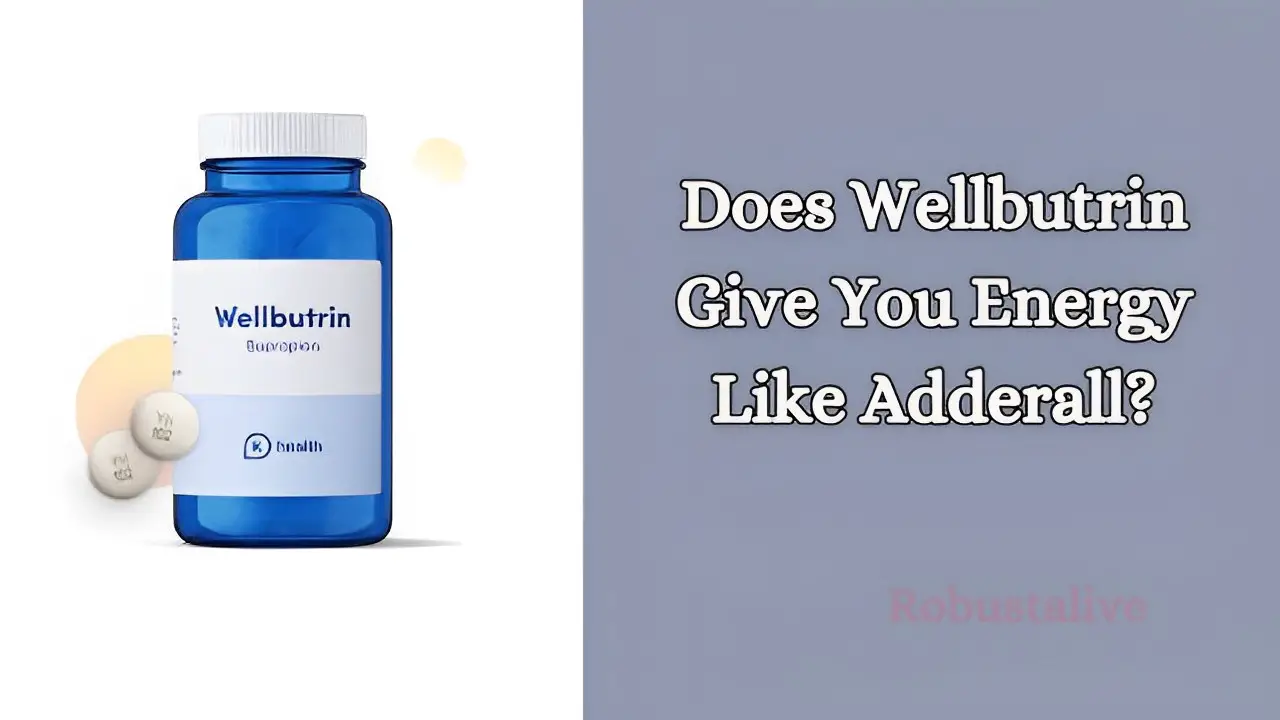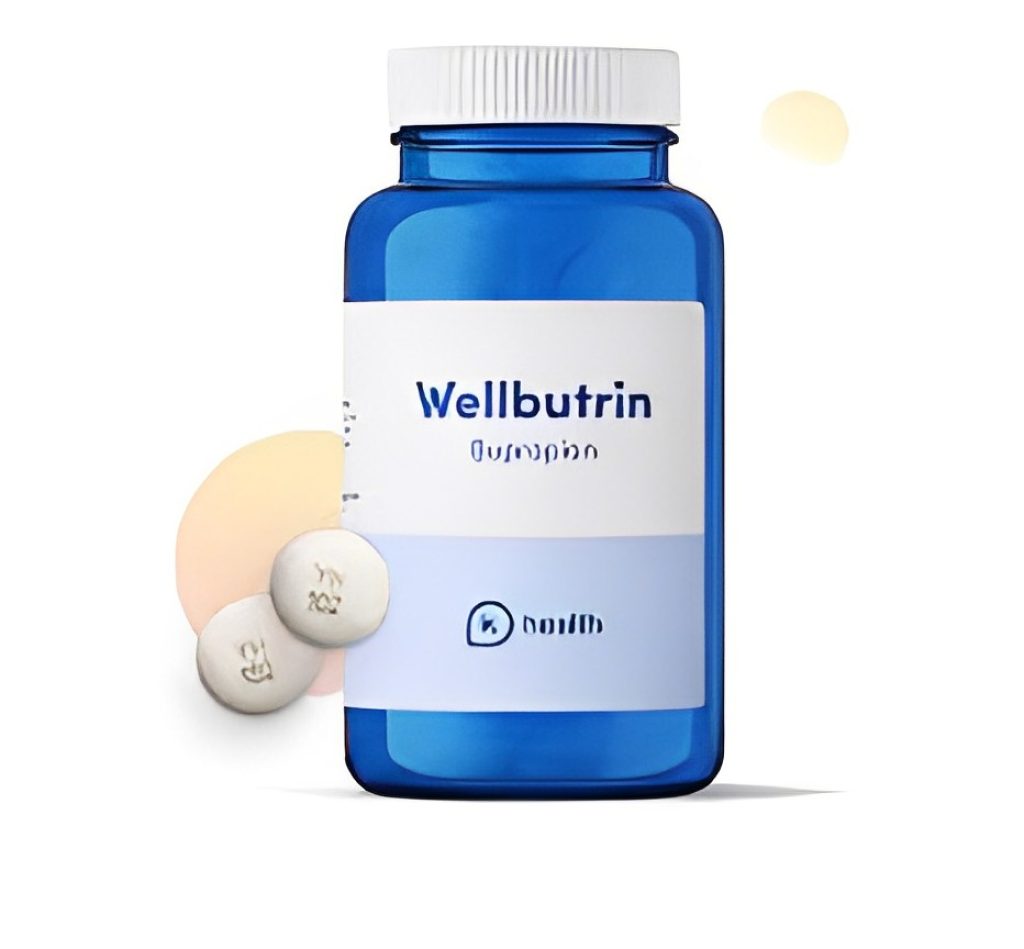Does Wellbutrin Give You Energy Like Adderall?

When managing low energy levels and depression, many individuals turn to medications like Wellbutrin and Adderall.
So, does Wellbutrin give you energy like Adderall?
Yes, Wellbutrin can give you energy like Adderall. Both medications increase energy levels but work differently. Wellbutrin boosts mood and energy by affecting neurotransmitters in the brain, while Adderall enhances focus and attention for ADHD. Individual responses may vary, so follow the prescribed dosage and consult a healthcare professional for proper monitoring.
This article explores how Wellbutrin and Adderall function and impact energy levels.
What Is Wellbutrin?

Wellbutrin is a medication commonly prescribed for the treatment of depression and seasonal affective disorder (SAD), a form of depression specifically occurring during winter months. Its primary component is bupropion hydrochloride. The medication comes in three different forms: immediate-release, sustained-release (SR), and extended-release (XL).
How Wellbutrin Works
The way Wellbutrin functions is by increasing levels of two essential brain chemicals: dopamine and norepinephrine. These chemicals significantly impact our experience of pleasure, ability to handle stress, and regulation of sleep and alertness. By slowing down their reabsorption in the brain, Wellbutrin allows these chemicals to stay longer and exert a more potent effect.
Wellbutrin Uses
Doctors may prescribe Wellbutrin for conditions not officially approved by regulatory authorities. This usage is known as “off-label” use.
Some of these off-label uses include:
- Bipolar disorder
- Attention deficit hyperactivity disorder (ADHD)
- Certain antidepressants cause sexual dysfunction
It’s crucial to take Wellbutrin as your doctor prescribes and avoid switching between different versions, which could be dangerous and cause an accidental overdose.
What Is Adderall?

Adderall, a prescription medication, is commonly used to treat attention deficit hyperactivity disorder (ADHD) and narcolepsy. This medication comprises a combination of amphetamine and dextroamphetamine, both classified as stimulants. Its primary purpose is to enhance focus and concentration in individuals who require medical assistance.
How Adderall Works
Adderall functions by elevating the levels of specific chemicals in the brain, specifically dopamine and norepinephrine. These chemicals are crucial for attention and motivation. By regulating these chemicals, Adderall enhances overall brain function and has been shown to decrease ADHD symptoms in approximately 70-80% of patients.
Adderall Uses
When used as directed by a healthcare professional, Adderall can effectively manage symptoms of ADHD and alleviate daytime sleepiness in individuals with narcolepsy. It is crucial to exclusively use Adderall under medical supervision due to its potential for dependency and the associated risks, such as high blood pressure and stroke.
Remember, obtaining or misusing Adderall without proper authorization is both illegal and potentially hazardous. It is essential to always heed your doctor’s advice and use medication responsibly.
Does Wellbutrin Give You Energy Like Adderall?
Both Wellbutrin and Adderall have the potential to induce feelings of energy and motivation, albeit they operate through distinct mechanisms. Wellbutrin, an atypical antidepressant categorized as a norepinephrine-dopamine reuptake inhibitor (NDRI), functions by inhibiting the reuptake of norepinephrine and dopamine in the brain. This action can bolster mood enhancement and provide a surge in energy levels.
Adderall, a central nervous system stimulant, functions by increasing the release of dopamine and norepinephrine while also inhibiting their reuptake. These actions can effectively enhance focus, attention, and concentration for individuals diagnosed with ADHD.
Both medications can increase energy levels, but Wellbutrin primarily treats depression, with its energizing effects considered a beneficial side effect. In contrast, Adderall is specifically prescribed to treat ADHD. Its energy-boosting effects are particularly noticeable in individuals without ADHD, which can potentially result in the sense of euphoria.
The response to Wellbutrin and Adderall can vary among individuals. Not everyone may experience a significant increase in energy. Additionally, it usually takes a few weeks for Wellbutrin to display its full effects. Gradual improvements in energy levels and mood are expected over time.
Does Wellbutrin Make You More Energetic Than Adderall?
In certain situations, Wellbutrin has the potential to deliver more pronounced energizing effects compared to Adderall. Acting as a norepinephrine and dopamine reuptake inhibitor (NDRI), Wellbutrin specifically targets these neurotransmitters closely linked with energy and motivation. By impeding their reabsorption, Wellbutrin boosts their levels in the brain, thus leading to heightened energy levels.
On the flip side, Adderall serves as a means to enhance focus and attention, specifically in individuals with ADHD. While it may also result in heightened energy levels, its primary mechanism of action revolves around improving cognitive abilities rather than generating overall energy or motivation.
How Long Does It Take For Wellbutrin To Give You Energy?
When Wellbutrin is used to treat depression, it typically takes approximately six to eight weeks for optimal effectiveness. However, some individuals may start experiencing improvements in their energy levels, sleep, and appetite within just one to two weeks of starting the treatment.
Similarities Between Wellbutrin And Adderall
ADHD Treatment: Wellbutrin, designed initially to address depressive disorders, can be prescribed to manage ADHD symptoms similar to Adderall. In specific individuals with ADHD, both medications have shown the potential to enhance focus and attention.
Prescription Medications: Wellbutrin and Adderall are both prescription medications, indicating that they should only be used with the guidance and oversight of a healthcare professional. It is essential to never utilize these medicines without obtaining a valid prescription from a doctor.
Side effects are common to both medicines. These include:
- dizziness
- headaches
- constipation
- nausea
- changes in appetite or weight
It’s important to note that these medications may also interact with other medicines used for treating seizures, heart disorders, high blood pressure, allergies, or other antidepressants.
Differences Between Wellbutrin And Adderall
Medicine Class: In the realm of medicine, Wellbutrin and Adderall exist in different medicine classes. While Wellbutrin falls under the category of aminoketones, Adderall is classified as a stimulant. This distinction impacts their functionality within the body and their intended purposes.
Primary Purpose: Wellbutrin is an antidepressant prescribed to alleviate depressive episodes. On the other hand, Adderall serves as a method to enhance focus, attention, and concentration in individuals diagnosed with ADHD or narcolepsy.
Addiction Potential: The potential for addiction differs between Adderall and Wellbutrin. Adderall, classified as a Schedule II controlled substance due to its stimulating effects and addictive properties, poses a higher risk for abuse and addiction. Conversely, Wellbutrin is sometimes utilized in aiding individuals with habits like smoking cessation.
Half-Life: In terms of half-life, Wellbutrin has a longer duration in the body compared to Adderall. This longer duration affects the frequency of medication intake and prescription guidelines.
FDA Approval: While Wellbutrin is FDA-approved for treating depressive disorders, it can also be prescribed off-label for other conditions. On the other hand, Adderall is specifically approved for ADHD and narcolepsy treatment.
Can You Take Wellbutrin And Adderall Together?
When Wellbutrin and Adderall are combined, it can pose a significant risk to one’s health. The potential for severe complications is high due to the individual risks associated with each medication. Taking them together increases the likelihood of experiencing adverse effects.
- Seizures: The simultaneous use of Wellbutrin and Adderall poses an increased risk of seizures. Wellbutrin has been found to be associated with seizures in approximately 1 out of every 1,000 patients. This risk becomes more substantial at higher doses. Furthermore, Adderall, being a central nervous system stimulant, further lowers the seizure threshold, making the combination even more risky.
- Weight Loss: Appetite suppression and weight loss are potential effects of both drugs. However, when taken in combination, they can lead to a significant decrease in appetite and even malnourishment.
- Liver Damage: Wellbutrin and Adderall can both individually cause damage to the liver. However, when these two drugs are combined, the risk of liver damage becomes even greater. This is particularly concerning for individuals who have a history of liver problems.
- Heart Issues: Heart problems are a concern when taking Wellbutrin, as it can raise blood pressure, especially for individuals with a history of high blood pressure or heart disease. Similarly, Adderall, being a stimulant, also impacts cardiovascular health. Combining both medications significantly increases the risk of severe heart-related issues.
- Serotonin Syndrome: When Wellbutrin and Adderall are taken together, it can result in serotonin syndrome. This condition arises when there is an excess of serotonin leaves in the body, posing a potential threat to one’s life. Indications of serotonin syndrome encompass agitation, confusion, accelerated heart rate, and even hypertension.
- Overlapping Side Effects: When Wellbutrin and Adderall are taken together, there can be overlapping side effects such as agitation, insomnia, and paranoia. This combination makes the overall experience more uncomfortable.
Given the significant dangers associated with combining Wellbutrin and Adderall, individuals must consult with a healthcare professional before considering such a combination. If someone is already taking either of these medications, they should inform their doctor about all the medicines they are using to prevent potential interactions and complications.
When Do Doctors Prefer Wellbutrin To Adderall?
Wellbutrin is sometimes considered an alternative to Adderall for treating ADHD in certain situations. Doctors may choose Wellbutrin over Adderall if:
- You don’t respond well to stimulant medications like Adderall.
- There are limitations to prescribing stimulants or controlled substances for you.
- Your history of substance use puts you at risk of misusing stimulant medications.
- You have another condition like depression alongside ADHD.
How To Take Wellbutrin
To use Wellbutrin safely, follow these instructions:
- The initial recommended dosage is 200 mg per day, to be taken in two doses of 100 mg each. After three days, your doctor may choose to increase the dosage to 300 mg per day, dividing it into three separate doses of 100 mg each. There must be at least six hours between these doses.
- Please make sure not to surpass a maximum daily dose of 450 mg, which should be administered in divided doses no higher than 150 mg each. If taking the 100-mg tablet, it can be consumed up to four times daily; however, please refrain from surpassing the limit of 150 mg in a single dose.
- Swallow Wellbutrin tablets whole without crushing, dividing, or chewing them. The medication can be taken with or without food.
- It is crucial to adhere to the prescribed instructions from your doctor. Do not change the dose or stop using Wellbutrin suddenly unless directed by your doctor due to a seizure.
- If you miss a dose, it should be taken promptly upon recollection. However, if the next scheduled dose is near, it is advisable to skip the missed one and refrain from consuming additional medication to compensate for it.
- Store Wellbutrin at room temperature, away from moisture and heat.
- Some people may experience high blood pressure, especially when using a nicotine replacement product and Wellbutrin. Regularly monitor blood pressure during treatment.
- If you ever need to stop taking Wellbutrin, it’s essential to consult your doctor first. This will help create a safe and gradual plan to avoid experiencing uncomfortable withdrawal symptoms.
- In case of an overdose, immediate medical attention should be sought, or the Poison Help line at 1-800-222-1222 should be called. It’s crucial to remember that an overdose of bupropion can have serious consequences, such as muscle stiffness, hallucinations, rapid heart rate, shallow breathing, or even fainting.
Wellbutrin Precautions
- When discussing allergies with your doctor, it is important to mention any bupropion allergies or other known allergens. This is because the product may contain inactive ingredients that could trigger allergic reactions.
- The patient’s medical history is crucial for the doctor’s evaluation. It is essential to inform your doctor about any relevant medical conditions you have had, especially if you have experienced seizures, brain/head injury, eating disorders, alcohol/drug dependence, diabetes, heart disease, kidney or liver problems, psychiatric disorders, or glaucoma.
- You should avoid abruptly stopping the use of sedatives used to treat seizures when considering the usage of Wellbutrin. Sudden discontinuation might increase the risk of experiencing seizures.
- Caution should be exercised when taking this medication, as it can potentially induce dizziness and hinder coordination. It is advisable to refrain from driving, operating machinery, or engaging in tasks that demand alertness until you regain the ability to perform them safely.
- Alcohol and marijuana should be avoided while taking Wellbutrin. These substances can increase dizziness and coordination issues. Additionally, consuming alcohol can raise the risk of seizures.
- Older adults have a higher likelihood of experiencing heightened sensitivity to the potential side effects of Wellbutrin, particularly dizziness and memory loss. This increased susceptibility may pose an elevated risk of falls.
- When it comes to pregnancy, it is essential to have a conversation with your doctor about the potential benefits and risks of using Wellbutrin. This is because untreated mental or mood issues can pose serious concerns. Remember, it is crucial not to discontinue any medication without your doctor’s guidance.
- Wellbutrin can pass into breast milk, which may potentially negatively affect a nursing infant. It is recommended that individuals consult their doctor before breastfeeding if they are currently using this medication.
Frequently Asked Questions (FAQs)
Does Wellbutrin Make You Feel Like Adderall?
In the realm of mental health, Wellbutrin serves as a catalyst for improved mood and overall well-being. By delicately balancing crucial chemicals like dopamine and norepinephrine within the brain, this medication grants individuals feelings of happiness. Beyond that, it proves valuable in addressing conditions like ADHD.
How Quickly Does Wellbutrin Start Working For ADHD?
Wellbutrin can start providing benefits for ADHD within 2-4 weeks, and some people might notice effects as early as 3-7 days, but it’s essential to stick to the prescribed dose to avoid potential side effects.
Can Wellbutrin Help With Focus?
Yes, Wellbutrin can help improve focus in some individuals with ADHD by targeting certain neurotransmitters in the brain. It may assist with difficulties initiating, sustaining, and transitioning focus, leading to better performance in various aspects of life.
Conclusion
Wellbutrin and Adderall can increase energy levels, but they work differently. Wellbutrin, an antidepressant, may provide energizing effects as a side effect. Adderall, a stimulant for ADHD, focuses on improving focus. Both can increase energy but through distinct mechanisms.
Does Wellbutrin give you energy like Adderall? They can, but it’s essential to understand their unique characteristics and prescribed usage.





